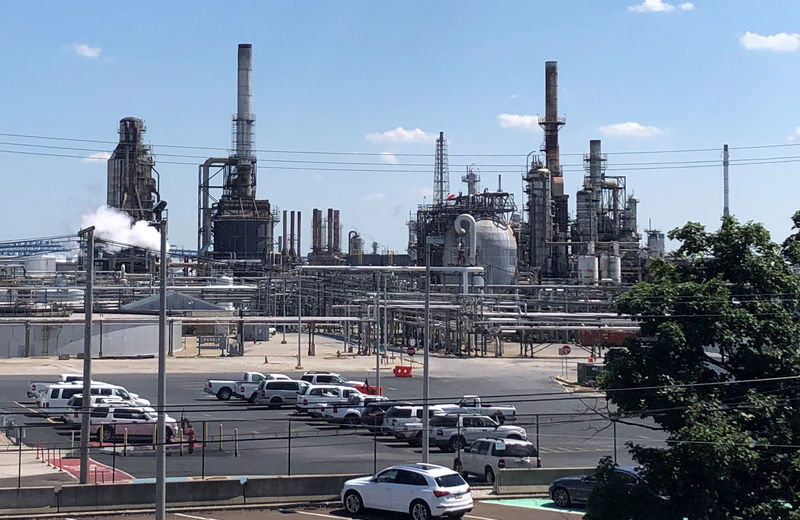By Noah Browning and Julia Payne
LONDON (Reuters) - A June 21 fire and explosion set to permanently close the biggest oil refinery on the U.S. East Coast has shaken markets as far away as the North Sea and West Africa, leaving millions of barrels of unsold oil in need of a new home.
The Philadelphia Energy Solutions (PES) refinery was a consistent buyer of light sweet crude oil, and the backlog of cargoes bound for PES are either in limbo or in the process of being diverted to neighboring refineries and abroad.
Prices for physical crude oil are being squeezed, with as many as 20 million barrels bound for PES in the process of being rerouted, according to two senior trading sources, adding to a global glut amid surging U.S. oil output and lackluster demand.
A PES spokeswoman declined to discuss the issue, telling Reuters: "We don't comment on our day to day or commercial operations."
The two senior oil traders said the refinery committed to purchases around two months in advance, so PES would need to place elsewhere in the market up to 20 cargoes of the "extra" oil once bound for the 335,000-barrel per day (bpd) refinery.
Around four of the cargoes originated from West Africa, one of the traders added, and the rest from the North Sea - where the backlog has sent prices plunging in recent days.
Differentials for key North Sea grade Forties plunged to 43 cents below dated Brent on Thursday, down sharply from near multi-year highs of a $1.25 premium earlier this month.
(For a graphic on 'Differentials for North Sea Forties crude' click https://tmsnrt.rs/32ARX22)
A similar loss was registered by the Brent stream and an even larger plunge towards multi-year lows for the smaller Oseberg grade.
PES, a consistent buyer of West African crude, appears to have mostly succeeded in diverting those shipments, with a cargo of Chadian Doba shown en route to the Bahamas aboard the "Homeric", according to traders and Refinitiv Eikon data.
A cargo of Nigerian Okono had yet to discharge but was parked just off Philadelphia, while three cargoes are discharging, or recently unloaded, at Delta Airlines Inc's (N:DAL) Monroe Energy refinery and another from Nigeria's Amenam stream was rerouted to Point Tupper, Nova Scotia.
The uncertainty over the cargoes, coupled with one of the highest excesses in monthly crude supply from Nigeria in months due to stiff competition from U.S. grades as well as the winding down of the summer driving seasons, has taken a toll.
"There's no doubt Nigerian is under a lot of pressure," another West Africa trader said.
Around 30 to 40 Nigerian cargoes for August export remain to be sold, and with several top sellers among the oil majors still struggling to place the cargoes, those seeking to offload cargoes are seeking to keep plummeting prices under wraps.
"Sellers in this kind of market don't like to throw numbers out, as they are competing with other sellers for the scant buyer interest," the trader added.
Despite the lack of transparency in West African crude trading compared with the North Sea, several traders said main grades Bonny Light and Qua Iboe were being offered at premiums of a little over $2 compared with date Brent.
Though still relatively high, the prices represent a plunge of about 60 cents from heights late last month.

(For a graphic on 'Differentials for Qua Iboe crude' click https://tmsnrt.rs/2O2knik)